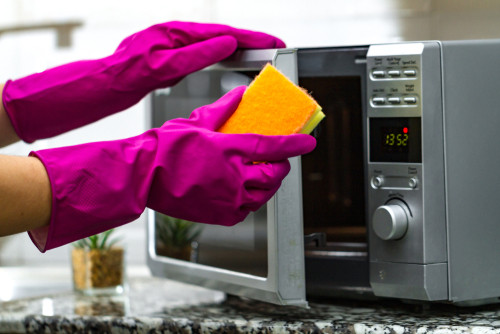Popular Reads
Top Results
Can't find what you're looking for?
View all search resultsPopular Reads
Top Results
Can't find what you're looking for?
View all search resultsYou've probably forgotten to clean these things in your kitchen
Here are all the items in your kitchen that you may not think of giving a deep clean but that you absolutely must to avoid any risk of contamination by the COVID or other viruses.
Change text size
Gift Premium Articles
to Anyone
This past June, traces of coronavirus were discovered by the Chinese authorities on a cutting board.
So the smartphone is not the only object of your daily life to be a nest of filth and germs!
Here are all the items in your kitchen that you may not think of giving a deep clean but that you absolutely must to avoid any risk of contamination by the covid or other viruses.
Microwaves
According to a British study conducted by kitchenware brand Olivers’ Kitchen, eight out of ten consumers in the United Kingdom have never cleaned their kitchen microwave from top to bottom.
However, 68 percent have thought about stripping their conventional ovens in the past year. The microwave is also worthy of a thorough cleaning to remove all traces of SARS-CoV-2.
Moreover, last April, France’s labor ministry recommended frequent, regular cleaning of microwaves in workplaces in a guide of good practices.
Because, no, the microwave is not a tool to eliminate the virus. The effects of electromagnetic oscillations on the new coronavirus are not precisely known.
Sponges
How often do you replace your dish sponges? You should throw them away at least... once a week!
According to a scientific study conducted in 2017 and published in the journal Nature, they may indeed contain up to 362 different species of bacteria, including staphylococci, e.coli or salmonella.
According to this report, which consisted of examining the contents of a sponge under a microscope, the kitchen and bathroom were found to be the rooms in the house with the greatest potential contamination by various pathogens. And all because of the sponges!
Read also: Six kitchen tools and how to clean them properly
Dish towels
In the same vein as the sponges to be changed regularly, kitchen towels are no exception to the rule.
According to a study published in June 2018 by the American Society of Microbiology, scientists at the University of Mauritius closely examined the contents of the cloths.
Almost half (49 percent) contained bacteria while coliforms were detected on 36.7 percent of them after one month of use; 36.7 percent had enterococci and 14.3 percent staphylococcus aureus.
Coming back to the study elaborated by the brand Oliver’s Kitchen, 64 percent of British people admit that they do not clean them regularly.
The solution: soak them in a mixture of hot water with vinegar or baking soda before putting them through the washing machine.
And of course, don’t wash the tea towels at the same time as your fine shirt or your favorite jeans.
Cutting boards
The board you use for chopping carrots and other seasonal vegetables could contain on average 200 times more fecal matter than your toilet seat! Researchers at the University of Arizona demonstrated this unsavory discovery.
Meanwhile, in China, the coronavirus was even detected on a cutting board used for preparing a salmon bought at the Beijing market. An epidemiological investigation was conducted this spring.
Chinese scientists finally demonstrated that the salmon could not transmit COVID-19. But the presence of Sars-Cov-2 on the cutting board in question remains somewhat of a mystery.











